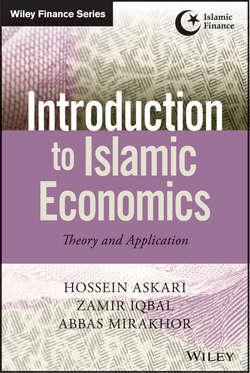Читать книгу Introduction to Islamic Economics - Mirakhor Abbas - Страница 15
На сайте Литреса книга снята с продажи.
Chapter 2
Foundation of the Islamic Economic Paradigm
ОглавлениеLearning objectives:
1. How Islam differs from other religions.
2. The difference between individual and societal goals in Islam.
3. The importance of rules (i.e., institutions) and rule compliance in Islam.
4. Why justice is so important in Islam.
5. The role of Shariah in Islamic economics and finance.
6. The meaning of maqasid-al-Shariah (objectives of Shariah).
7. The foundational elements of Islamic teachings.
8. The importance of agent-trustee in Islam and in preserving the rights of all generations.
Four fundamental concepts support the rules-based religion that is Islam. First is walayahh, the unconditional, dynamic, active, ever-present love of the Supreme Creator for His creation, which is manifested through the act of creation and the provision of sustenance for all humans. This involves providing sufficient resources to sustain life and divine rules to sustain and flourish on this earth. Humans reciprocate His love by extending their love to other humans and to the rest of creation. Second is the concept of karamah, human dignity. The Quran considers humans to be the crowning achievement of His creation for whose personal and collective development everything else has been created. Indeed, humans are the purpose of creation. The third concept is the meethaq, the covenant in which all humans were called before their Supreme Creator and asked to testify that they recognize in Him the One and Only Creator and Sustainer of the entire creation and all other implications flowing from this testimony.24
The concept of meethaq, in turn, unfolds into three basic principles:
1. Tawheed, the One-and-Onlyness of the Creator, which unfolds into the one-and-onlyness of the created and its unity, including above all the unity of humankind
2. Nubbowah, the continuous chain of humans (prophets) appointed by the Creator to remind, warn, cleanse, teach, and induce humans to bring about and uphold justice within the created order through their position of agency-trustee assigned and empowered by the Supreme Creator
3. Maád, the return of creation to its origin and the accountability of humanity (individually and collectively) for acts of commission and omission – success and failure in achieving, establishing, and upholding justice toward their selves, toward others of their kind, and toward the rest of creation
The fourth concept is that of khilafa, agent-trustee relationship. Khilafah is the empowerment of humans by their Creator as agent-trustee to extend His love and compassion to one another, materially through the resources provided to them by the Creator and nonmaterially through the manifestation of unconditional love for their own kind as well as for the rest of creation.
A number of verses of the Quran affirm and confirm the unity of humankind. These verses, plus those recounting the provision of physical-material as well as nonphysical faculties and facilities created for all humans that empower them economically and spiritually, form the cornerstone of the legislative framework of rules (institutions) for the socioeconomic-political behavior of humans. Resources are created for all humans of all generations, who compose one humanity. Their diversity does not and should not mean their disunity. By the primordial covenant, not only do all humans recognize their own unity, they also have full cognition of their responsibility to maintain the unity and integrity of the rest of creation through their service to humanity and to the rest of creation.
Unity operates at two levels, societal and individual. On the social plane, unity expresses itself in the integration of human society. Islam refuses to accept as the ultimate unit of body politic anything less than the totality of Islamic community, or the ummah. It is a responsibility of this collectivity to ensure that all obstacles are removed from the individual's path to Allah (swt). Whether the individual will choose this path for this ultimate happiness is then his or her own personal choice. There is only one Muslim people, no matter how scattered and far removed its members may be. Only the complete ummah comprises that circle which is Islam, and no segment of the Muslim community has a right to be the ummah any more than a segment of a circle could claim circularity. On the personal level, unity is manifested in one's actions. It is the appropriation to one's self as well as the proclamation in implementation and living a life that has integrity. The concept of Islamic community cannot be overemphasized.
24
They were collectively asked to testify to the Oneness and Uniqueness of the Creator as the One and the Only Cherisher Lord (Rabb) of all creation and everything else that this declaration implies, including the necessity of complying with rules of behavior, which their Lord Creator has ordained and prescribed for a life of felicity on earth. All members of this cycle of humanity, that is, all the progeny of Adam, testified so (Quran 7:172).
